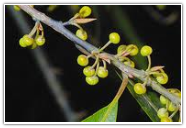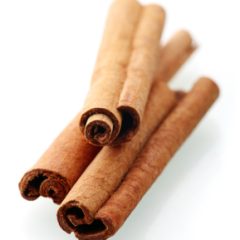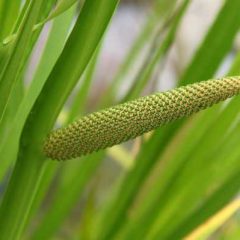Litsea Cubeba essential oil, China, is also known as May Chang. A member of the Laurel family, the small tree is common throughout Asia. Although its fragrant properties were widely known for centuries, it wasn't steam distilled until about 60 years ago. Since then, it has become popular and is sometimes used in place of Lemongrass. Lemongrass occasionally has an unfavorable methyl heptenone note not present in Litsea Cubeba. However, the sweet lemony high notes are virtually the same. For this reason it may be that Litsea Cubeba is preferable to Lemongrass. The price difference is negligible and the citral content is virtually the same.
Litsea Cubeba is native to Asia and most of the oil is from Malaysia and China. Litsea Cubeba is also known as Chinese pepper because of its pepper-like fruit from which the oil is extracted. Litsea Cubeba is widely used in the perfume industry.
Like Lemongrass and Lime this is a very strong essential oil. Care is recommended in dosage.
The essential oil derived from the pepper-like fruit of the Chinese may chang tree is known as either may chang or litsea cubeba essential oil. Although Asian herbalists have used the fruits and flowers of the may chang tree for centuries, extraction of the essential oil goes back only about 60 years. Look for may chang essential oil in health food stores and specialty retailers. The oil may increase pressure on the eyes, so avoid using it where glaucoma is an issue. Always check with your health care practitioner before using any herbal therapy.
Medicinal Massage: When diluted in a carrier oil, may chang essential oil helps to open up the bronchial passages for those suffering from bronchitis, allergies, asthma and other chest ailments, according to author Kathi Keville's book "Aromatherapy: A Complete Guide to the Healing Art." In traditional Chinese medicine, may chang sometimes blends with other medicines in throat gargles, but only experienced practitioners should combine essential oils for internal use. Chinese physicians also use may chang oil to regulate blood pressure and heart rate, according to Keville.
When used in a diffuser or vaporizer, may chang creates a cheerful atmosphere. It is mood enhancing. Aromatherapist Peter Holmes recommends using a blend of two parts mandarin essential oil to one part may chang oil as a room freshener and to relax and uplift the moods of its inhabitants.
While on the subject of fragrance, include may chang oil in potpourris and personal fragrance products. Perfume author Mandy Aftel notes that she prefers may chang, or litsea cubeba, to other citrus-derived essential oils. The oil is more stable than lemon peel oil, which goes rancid more quickly. Additionally, may chang essential oil doesn't possess any of the harsh notes lemongrass oil might, and is less expensive than lemon verbena oil. May chang oil has floral as well as citrus notes, making it more versatile as a perfume ingredient, according to Aftel. "Unlike true lemon oil, which must be a top note, litsea cubeba allows the possibility of introducing a lemon scent in the middle note of the perfume," Aftel points out. Blend may chang with other citrus notes such as petigrain and with rosemary and lavender, Aftel suggests.
Litsea cubeba oil can be used for skin care. Because it has antifungal and antibacterial properties, may chang works well in lotions and soaps. Consider adding the essential oil to homemade or commercial products to treat acne, eczema and other skin conditions.
Include may chang essential oil in natural insect-repelling preparations. Blend it into liquid body wash, shampoo and body lotion, and add a drop or two to outdoor candles. The oil may be helpful in warding off mosquitoes, and may even be added to a natural shampoo for dogs, along with other ingredients like honey, lemongrass oil and citronella oil.
Safety: Litsea essential oil is non-toxic and, in general, a non-irritant; however litsea essential oil may cause a reaction in those with sensitive skin. Litsea essential oil should not be used with children under the age of 10 years; this oil is high in the powerful chemical component of aldehydes. Professional advice should be sought from an aromatherapist if unfamiliar in the use of essential oils.
You must be logged in to post a review.






Reviews
There are no reviews yet.